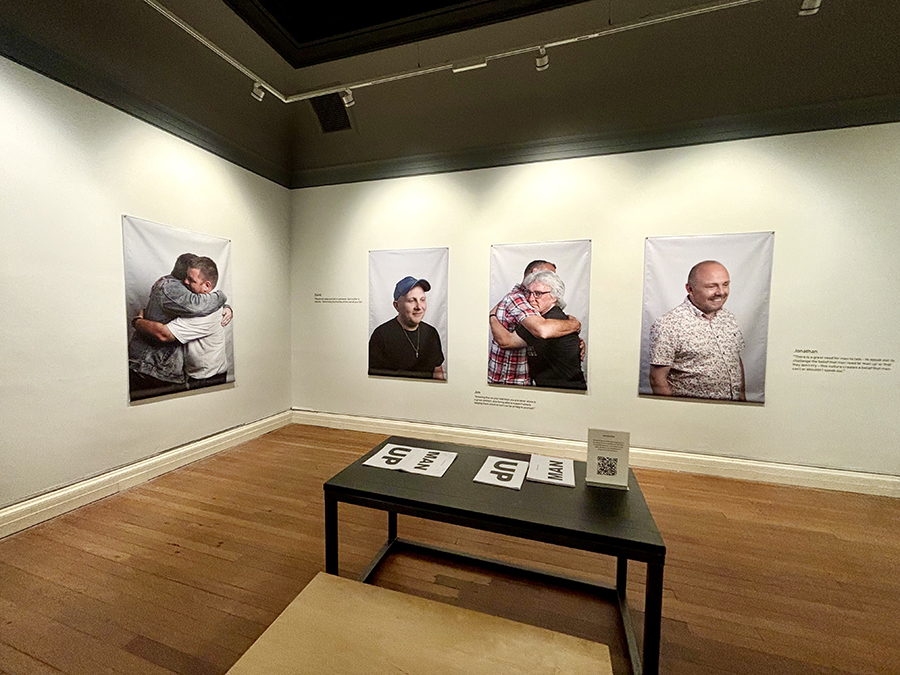
MAN UP
Photographic artist Richard Ansett is conscious of the responsibility to the communities he documents, recognising the potential for misrepresentation of an ‘outsider’s gaze’. His body of work has been influenced by his adoption with no knowledge of his biological parents and in this sense he defines himself as a rootless ‘existential outsider’. Ansett doesn’t allow himself to be affected by any sense of disadvantage however and his background has inspired a lifetime’s search for a better understanding of place supported by his camera. He sees any arrival to a new landscape as potential to bring a fresh perspective to a view ‘coloured by familiarity’. Instead of seeing difference, Ansett’s detachment is his superpower, inspiring a search for a shared experience. In this sense he does not consider himself an outsider at all.
On arrival in Lincolnshire Ansett began an engagement with the community through the investigation of mental health support networks in the area and discovered small self-help groups specifically for men. MAN UP introduces some of these men attending a local meeting organised by BroPro UK, an organisation that encourages peer to peer support dedicated to creating safe spaces for men to meet and talk and share life experiences or just be alongside others. These portraits are of just a few men who have had the courage to admit they need support, they have reached out and found men like themselves who, through their own experience, realised they could be of help and support to each other.
“These images and testimonies are a snap shot of a larger men’s mental health crisis throughout the UK. Some of the old legacies of masculinity are toxic to good mental health and are letting us all down. We are finding ourselves increasingly ill-equipped to cope alone with the pressures of modern life and without support we can experience depression and potentially suicidal ideation.” Richard Ansett
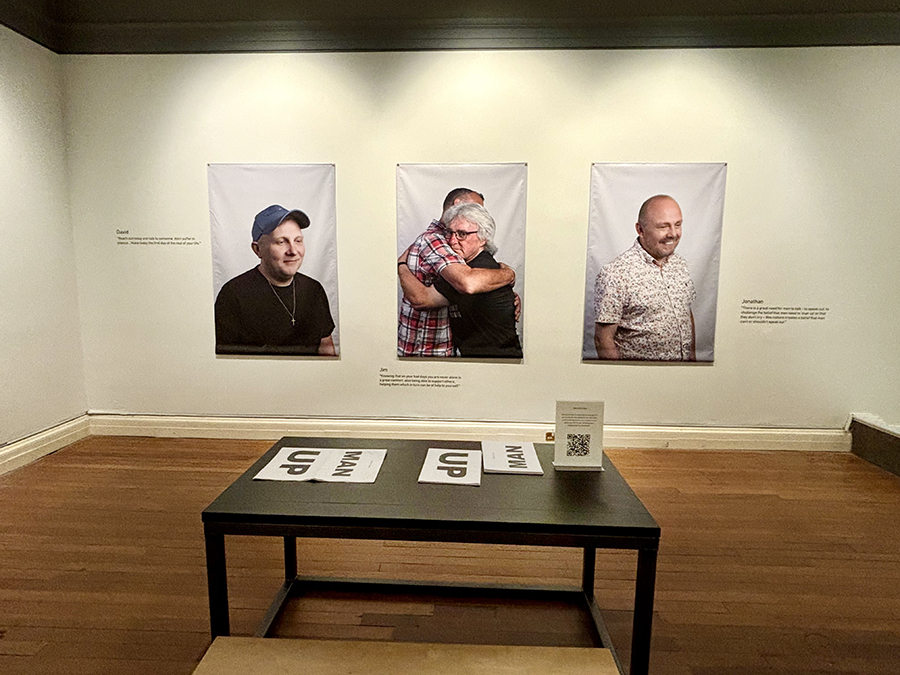
MAN UP
Photographic artist Richard Ansett is conscious of the responsibility to the communities he documents, recognising the potential for misrepresentation of an ‘outsider’s gaze’. His body of work has been influenced by his adoption with no knowledge of his biological parents and in this sense he defines himself as a rootless ‘existential outsider’. Ansett doesn’t allow himself to be affected by any sense of disadvantage however and his background has inspired a lifetime’s search for a better understanding of place supported by his camera. He sees any arrival to a new landscape as potential to bring a fresh perspective to a view ‘coloured by familiarity’. Instead of seeing difference, Ansett’s detachment is his superpower, inspiring a search for a shared experience. In this sense he does not consider himself an outsider at all.
On arrival in Lincolnshire Ansett began an engagement with the community through the investigation of mental health support networks in the area and discovered small self-help groups specifically for men. MAN UP introduces some of these men attending a local meeting organised by BroPro UK, an organisation that encourages peer to peer support dedicated to creating safe spaces for men to meet and talk and share life experiences or just be alongside others. These portraits are of just a few men who have had the courage to admit they need support, they have reached out and found men like themselves who, through their own experience, realised they could be of help and support to each other.
“These images and testimonies are a snap shot of a larger men’s mental health crisis throughout the UK. Some of the old legacies of masculinity are toxic to good mental health and are letting us all down. We are finding ourselves increasingly ill-equipped to cope alone with the pressures of modern life and without support we can experience depression and potentially suicidal ideation.” Richard Ansett
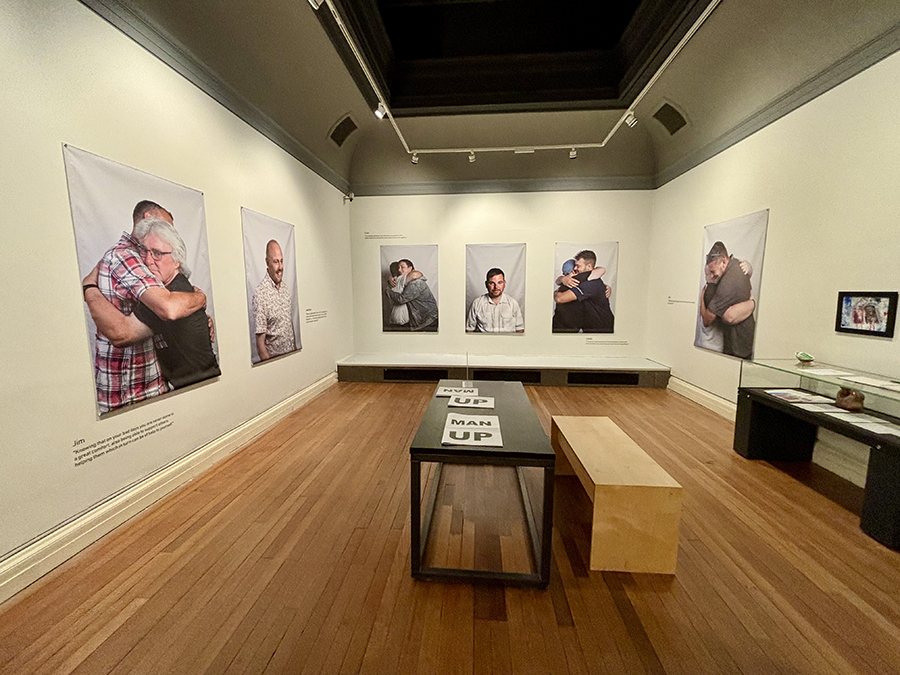
MAN UP
Photographic artist Richard Ansett is conscious of the responsibility to the communities he documents, recognising the potential for misrepresentation of an ‘outsider’s gaze’. His body of work has been influenced by his adoption with no knowledge of his biological parents and in this sense he defines himself as a rootless ‘existential outsider’. Ansett doesn’t allow himself to be affected by any sense of disadvantage however and his background has inspired a lifetime’s search for a better understanding of place supported by his camera. He sees any arrival to a new landscape as potential to bring a fresh perspective to a view ‘coloured by familiarity’. Instead of seeing difference, Ansett’s detachment is his superpower, inspiring a search for a shared experience. In this sense he does not consider himself an outsider at all.
On arrival in Lincolnshire Ansett began an engagement with the community through the investigation of mental health support networks in the area and discovered small self-help groups specifically for men. MAN UP introduces some of these men attending a local meeting organised by BroPro UK, an organisation that encourages peer to peer support dedicated to creating safe spaces for men to meet and talk and share life experiences or just be alongside others. These portraits are of just a few men who have had the courage to admit they need support, they have reached out and found men like themselves who, through their own experience, realised they could be of help and support to each other.
“These images and testimonies are a snap shot of a larger men’s mental health crisis throughout the UK. Some of the old legacies of masculinity are toxic to good mental health and are letting us all down. We are finding ourselves increasingly ill-equipped to cope alone with the pressures of modern life and without support we can experience depression and potentially suicidal ideation.” Richard Ansett
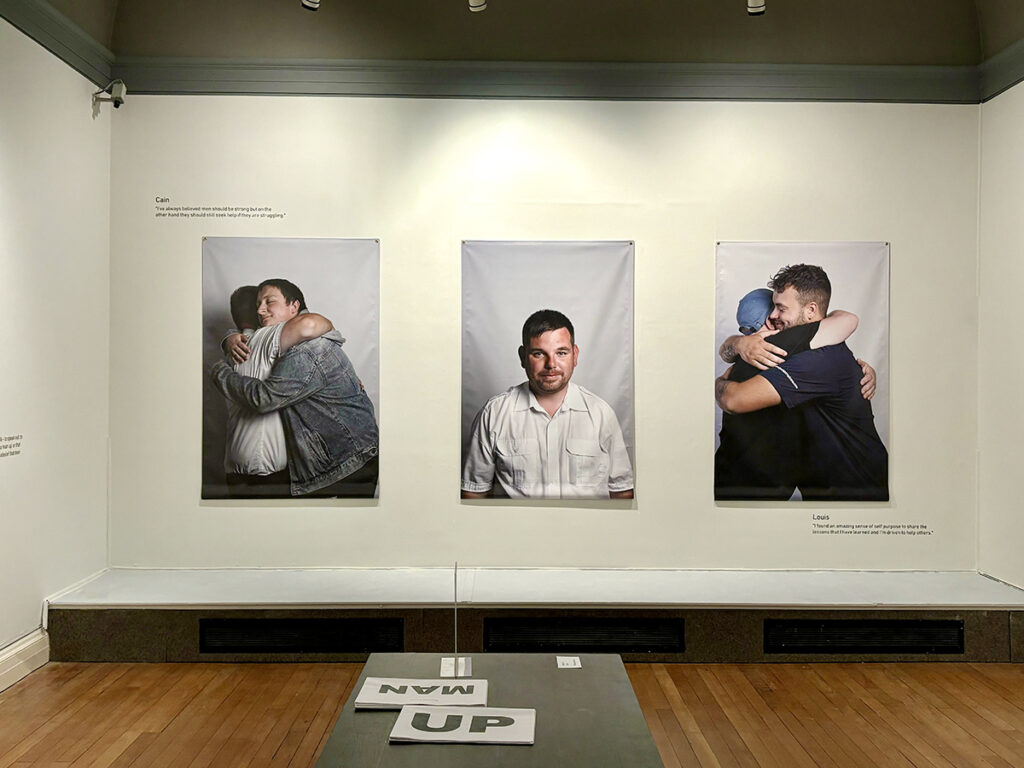
MAN UP
Photographic artist Richard Ansett is conscious of the responsibility to the communities he documents, recognising the potential for misrepresentation of an ‘outsider’s gaze’. His body of work has been influenced by his adoption with no knowledge of his biological parents and in this sense he defines himself as a rootless ‘existential outsider’. Ansett doesn’t allow himself to be affected by any sense of disadvantage however and his background has inspired a lifetime’s search for a better understanding of place supported by his camera. He sees any arrival to a new landscape as potential to bring a fresh perspective to a view ‘coloured by familiarity’. Instead of seeing difference, Ansett’s detachment is his superpower, inspiring a search for a shared experience. In this sense he does not consider himself an outsider at all.
On arrival in Lincolnshire Ansett began an engagement with the community through the investigation of mental health support networks in the area and discovered small self-help groups specifically for men. MAN UP introduces some of these men attending a local meeting organised by BroPro UK, an organisation that encourages peer to peer support dedicated to creating safe spaces for men to meet and talk and share life experiences or just be alongside others. These portraits are of just a few men who have had the courage to admit they need support, they have reached out and found men like themselves who, through their own experience, realised they could be of help and support to each other.
“These images and testimonies are a snap shot of a larger men’s mental health crisis throughout the UK. Some of the old legacies of masculinity are toxic to good mental health and are letting us all down. We are finding ourselves increasingly ill-equipped to cope alone with the pressures of modern life and without support we can experience depression and potentially suicidal ideation.” Richard Ansett
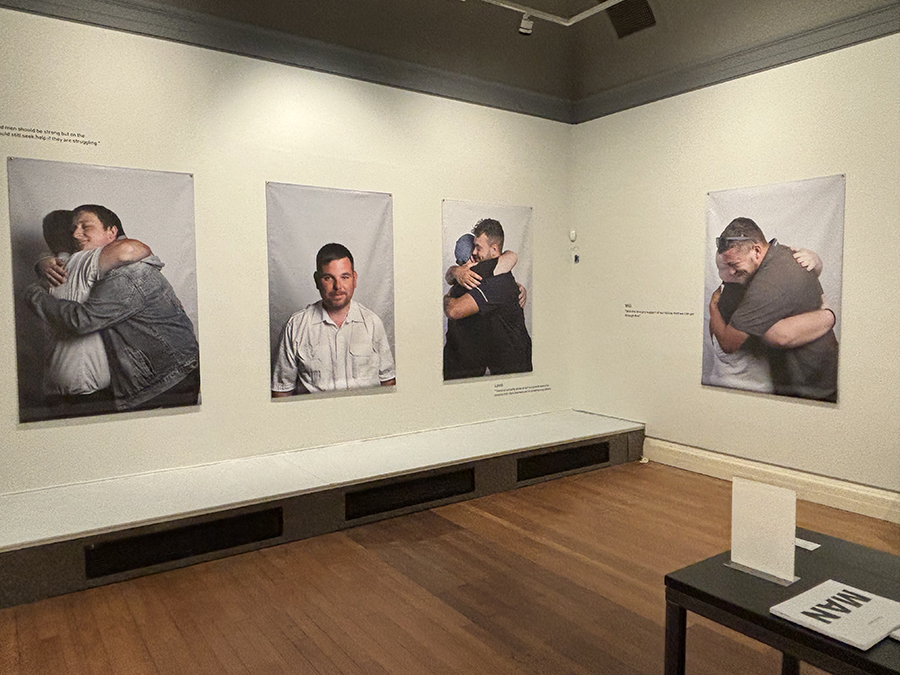
MAN UP
Photographic artist Richard Ansett is conscious of the responsibility to the communities he documents, recognising the potential for misrepresentation of an ‘outsider’s gaze’. His body of work has been influenced by his adoption with no knowledge of his biological parents and in this sense he defines himself as a rootless ‘existential outsider’. Ansett doesn’t allow himself to be affected by any sense of disadvantage however and his background has inspired a lifetime’s search for a better understanding of place supported by his camera. He sees any arrival to a new landscape as potential to bring a fresh perspective to a view ‘coloured by familiarity’. Instead of seeing difference, Ansett’s detachment is his superpower, inspiring a search for a shared experience. In this sense he does not consider himself an outsider at all.
On arrival in Lincolnshire Ansett began an engagement with the community through the investigation of mental health support networks in the area and discovered small self-help groups specifically for men. MAN UP introduces some of these men attending a local meeting organised by BroPro UK, an organisation that encourages peer to peer support dedicated to creating safe spaces for men to meet and talk and share life experiences or just be alongside others. These portraits are of just a few men who have had the courage to admit they need support, they have reached out and found men like themselves who, through their own experience, realised they could be of help and support to each other.
“These images and testimonies are a snap shot of a larger men’s mental health crisis throughout the UK. Some of the old legacies of masculinity are toxic to good mental health and are letting us all down. We are finding ourselves increasingly ill-equipped to cope alone with the pressures of modern life and without support we can experience depression and potentially suicidal ideation.” Richard Ansett
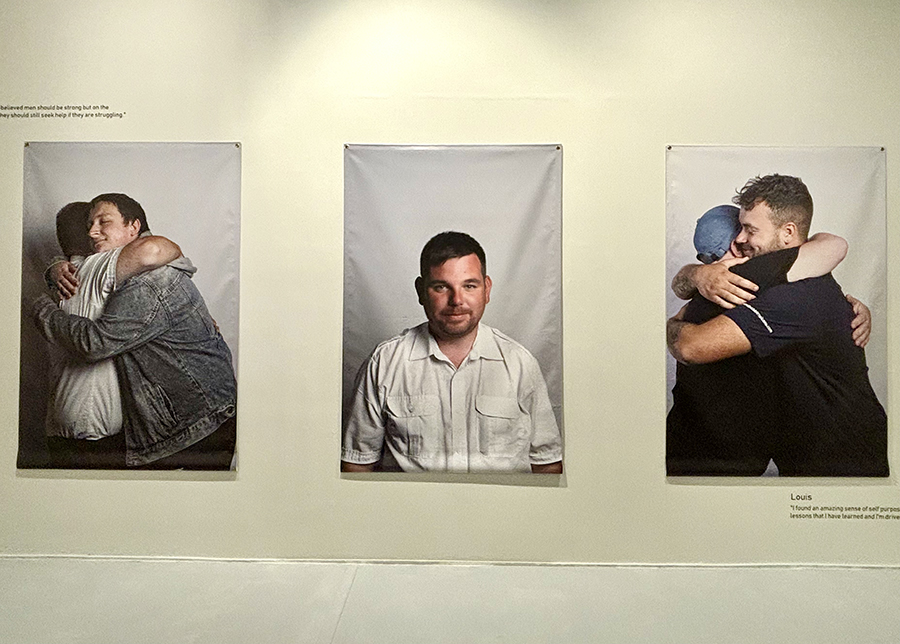
MAN UP
Photographic artist Richard Ansett is conscious of the responsibility to the communities he documents, recognising the potential for misrepresentation of an ‘outsider’s gaze’. His body of work has been influenced by his adoption with no knowledge of his biological parents and in this sense he defines himself as a rootless ‘existential outsider’. Ansett doesn’t allow himself to be affected by any sense of disadvantage however and his background has inspired a lifetime’s search for a better understanding of place supported by his camera. He sees any arrival to a new landscape as potential to bring a fresh perspective to a view ‘coloured by familiarity’. Instead of seeing difference, Ansett’s detachment is his superpower, inspiring a search for a shared experience. In this sense he does not consider himself an outsider at all.
On arrival in Lincolnshire Ansett began an engagement with the community through the investigation of mental health support networks in the area and discovered small self-help groups specifically for men. MAN UP introduces some of these men attending a local meeting organised by BroPro UK, an organisation that encourages peer to peer support dedicated to creating safe spaces for men to meet and talk and share life experiences or just be alongside others. These portraits are of just a few men who have had the courage to admit they need support, they have reached out and found men like themselves who, through their own experience, realised they could be of help and support to each other.
“These images and testimonies are a snap shot of a larger men’s mental health crisis throughout the UK. Some of the old legacies of masculinity are toxic to good mental health and are letting us all down. We are finding ourselves increasingly ill-equipped to cope alone with the pressures of modern life and without support we can experience depression and potentially suicidal ideation.” Richard Ansett